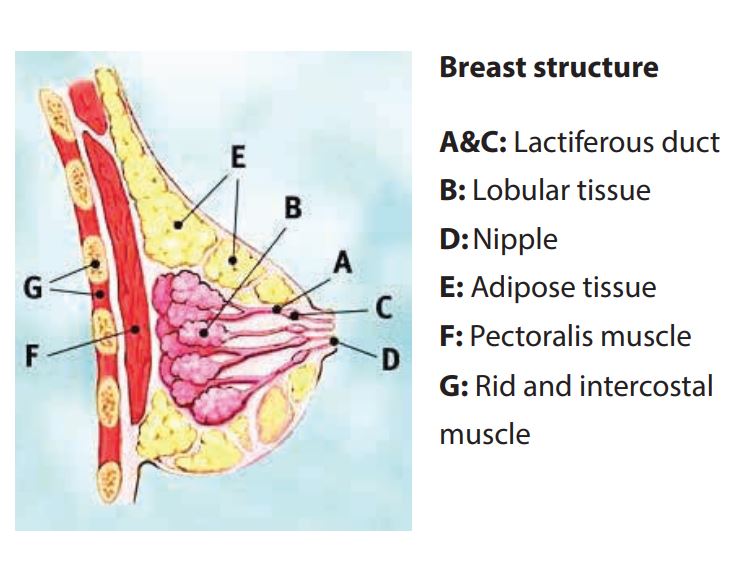Radiation on your breast can sometimes cause side effects. You may or may not experience adverse effects. The effects and their severity vary from person to person. This sheet contains detailed information about potential side effects and ways to deal with them. Generally, these effects appear in the 3rd week of treatment and can affect all organs located in the area treated. These trends become more acute at the end of treatment.
Breast structure
The skin of your breast, the lower part of your neck and your armpit might become red, 2 to 3 weeks after the beginning of your radiotherapy. This happens mostly in pleats (under-mammary sulcus) and trends to become more and more acute, more the radiotherapy course is closed to its end. Your nipple might be itchy and sour and your breast might also feel heavy, painful and increase of volume.
During your treatment, your skin will be likely darken on the area treated and remain darker for some time after the end of treatment.

Practical advice:
- Do not cover your skin
- Bath with a mild soap
- Avoid deodorants and perfumes
- Avoid tight and synthetic clothes. Wear cotton clothes
- Protect the treated area from the sun
Do not apply anything on your skin without consulting with your radiation oncologist first.
Effects on the shoulder and the arm:
A clear distinction must be made between the side effects due to radiotherapy and those caused by surgery.
Radiotherapy: may sometimes cause irreversible armpit hair loss 3 to 4 weeks after the beginning of your treatment. This is never painful.
Surgery of the axilla may limit arm motion, be painful, and generate a feeling of heaviness.
Practical advice:
In order to avoid lymph edema (“big arm”), which you might experience in case of irradiation to the axillary area and axillary surgery, you should avoid these factors on the arm of surgery’s side:
- Carrying heavy things, and repetitive movements,
- Injuries on your arm or hand (should you be injured, disinfect the injury),
- Taking blood samples from and blood pressure
If your motion is limited, physiotherapy can be prescribed
Fatigue:
Feeling tired does not mean that your condition is deteriorating. It is usually due to the daily repetition of your treatment and to the trips to the hospital. The treatment itself never causes fatigue. Adapt your daily activities to your daily condition and do not try to do too much effort.
Swallowing problems:
During treatment, your oesophagus might become irritated. As a result, 3 to 4 weeks after the beginning of your treatment, you might find it difficult to swallow.
You may or may not experience the above side effects.
Most impression of irritation and congestion will progressively disappear a few weeks after the end of your treatment.
Tell the therapeutic radiographers or your radiation oncologist about any unusual feelings you may have to receive appropriate treatment.
Your radiation oncologist will give you the most appropriate treatment for your specific case.
Ask him/her any further question you may have.

 Vi
Vi 












